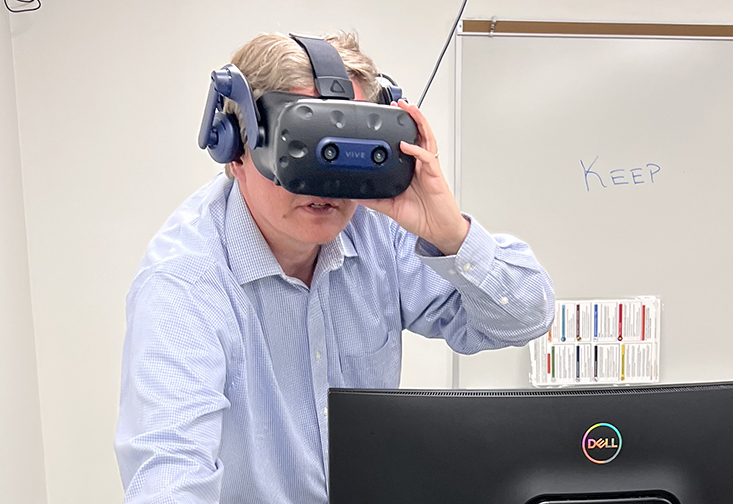By Sarah Sell, University Communications and Marketing
Imagine taking a tour of the International Space Station or seeing the Mona Lisa at the Louvre in Paris without leaving your classroom.
It's already possible, and USF's College of Education wants to ensure students know how to utilize the technology through a new Emerging Technology Lab being developed on the St. Petersburg campus.
The space will include augmented reality (AR) and virtual reality (VR) stations and drone technology, providing students from all majors with real-world experiences through visual and interactive content.
"As an educator, I can't prepare you for what the classroom is like now; I have to prepare you for what the classroom will look like in five years," said David Rosengrant, campus dean of the College of Education on the St. Petersburg campus. "A lot of these technologies will be part of that. So, it could be as simple as going on a field trip. I can't take my students to the International Space Station, but I can in virtual reality."
The Emerging Technology Lab will be built in two unused classrooms next to the science, technology, engineering and math (STEM) Inquiry Lab over the summer. The corridor inside Heller Hall will be called Innovation Lane.
The STEM lab currently provides students with robotics and 3D printing training, while the Emerging Technology Lab will focus on concepts related to AR and VR and drones.
With AR, students can utilize their phones and other devices to create simulations in real time. Rosengrant highlighted Pokemon GO as the best example of a game that utilizes AR technology. The smartphone app uses GPS and mapping technology to create an 'augmented reality' where players interact with Pokémon characters.
The same technology can be applied to pieces of art or physics, where students can learn about magnetic fields, rotational motion, thermodynamics, optics, forces and circuits.
VR creates a digital environment where students can utilize headsets with programs that immerse them in their surroundings. For example, VR could take them inside a museum or research lab or provide teacher training through interactions with students with special needs. By going into that environment, they can understand what an autistic child is going through when triggered, developing empathy skills with students who will be future teachers.
Students can also learn how to pilot a drone. The lab will have the technology on hand so small drones can be flown inside the classroom.
"You have to adapt to the world around you," Rosengrant said. "A lot of teachers don't even want to try doing virtual or augmented reality because they don't understand it. It's not their world, but it's their student's world. And if we, as educators, don't go into our students' world where they are comfortable and use that as motivation, then we are missing out on a lot of learning opportunities."
The new Emerging Technology Lab will be available for all USF faculty across campus to utilize and is expected to open for the start of the fall 2023 semester.
